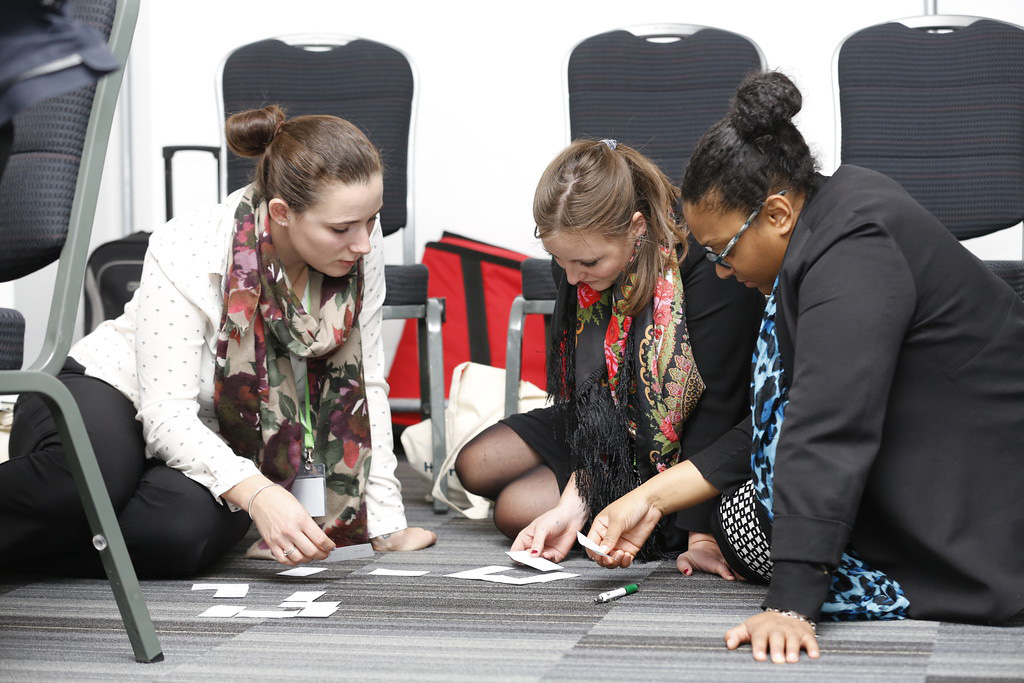
A dynamic professional development programme run by a teaching school alliance helps develop staff into leaders and drives school improvement in a large multi-academy trust in London.
Harris Federation comprises 19 primary, 22 secondary, 3 all through academies and a sixth form college in Greater London and Essex. The Harris Federation Teaching School Alliance (HFTSA) is made up of all Harris academies and other local schools and academies from Essex and 12 London boroughs. Underpinning their approach is that all schools in the alliance receive support.
The alliance is led by 2 designated teaching schools: Harris City Academy Crystal Palace in south London and Harris Academy Chafford Hundred in Thurrock, Essex. They use schools judged by Ofsted to be good and outstanding to lead the delivery of CPD and school-to-school support.
The teaching schools play a key role in driving professional development for all schools within the trust, as well as supporting school improvement through school-to-school support, deploying specialist leaders of education (SLEs) into alliance schools to share expertise, and training new teachers through its school-centred initial teacher training (SCITT) provision.
Promoting leadership development
Creating new generations of school leaders is a priority for the Harris Federation. “With so many academies in our group we have an obligation to ensure there is a steady supply of exceptional leaders moving up through the profession,” says Director of Teaching School Sharie Omoragbon.
It is imperative that we continually upskill staff at all levels of teaching both within and beyond our federation. Because of this we bid for a licence to deliver the National Professional Qualifications to school leaders. We want to make a difference to schools through highly effective CPD.
The Harris culture of professional development has certainly helped Jordan Hollis, now entering his third year of teaching at Harris Primary Academy Haling Park in Croydon. Jordan completed a National Professional Qualification in Senior Leadership (NPQSL) in March 2017.
"As soon as I joined the academy the senior leadership team wanted to know my professional development aspirations,” he explains.
I completed a questionnaire that asked me where I thought I was in my development and where I saw myself going next. I had previously completed a middle leadership qualification so the next logical step was senior leadership training. The Executive Principal informed me that she wanted to put me forward for the NPQSL programme.
Part of the programme involved delivering a sustainable school-based improvement task linked to a whole school improvement priority within his academy. Jordan led a project to improve phonics at the academy and was able to make a significant improvement to the children’s performance.
Jordan says that the qualification has been a real boost to his career development too. As soon as he completed the programme he applied for and was promoted to an assistant principal post at his school, which he started recently.
The Harris Federation teaching school alliance has used Jordan’s experiences and feedback to inform the development of its new, reformed National Professional Qualifications which they will begin delivering this year. Jordan has a valuable role working with the alliance to shape the participant experience and content delivery for the programmes.
Jordan’s experience is typical, according to the teaching school’s impact data. Over 75% of participants were promoted after completing a leadership development programme with the teaching school alliance, confirming that the training helped secure promotion.
“I don’t think that I would have been promoted without the encouragement and the opportunities I’ve been offered through the NPQSL programme,” Jordan adds. “The programme has really showed me and the school that I can manage a senior leadership role effectively."
Learning networks
Central to the professional development approach within Harris is a professional learning network made up of professional learning leaders representing each academy. Learning leaders meet half-termly to share best practice and evidence-based learning between schools and often invite external organisations to present to the group.
“At the last network meeting we welcomed a representative from University College London (UCL) to talk to the group about the UCL professional learning network and free resource forum for teachers,” Sharie Omoragbon explains. “Several of our staff have since joined the network as a result and have fed back on how useful the resources are.’’
The meetings are also used to discuss key professional development priorities for different staff groups, such as subject specific priorities, support for NQTs, teaching assistants or non-teaching staff. Each year the teaching school alliance asks group members to survey their staff members to identify specific development needs. Feedback from the surveys then informs the teaching school CPD offer for that academic year.
There is also an annual conference that brings everyone from the alliance together for professional development. “It’s a great opportunity for colleagues to learn from each other, share ideas and network with other professionals beyond their own schools,” says Sharie. Workshops are organised based on the feedback from the CPD surveys.
Supporting teacher retention and development
Findings from the annual CPD audits and internal recruitment and retention research have revealed a need to provide greater support to newly qualified teachers beyond their NQT year so that they continue to feel fully supported after completing their NQT year. This has led to the creation of a bespoke programme designed to support recently qualified teachers, with 1 or 2 years’ experience. Trends in the teaching school’s research show that NQTs tend to leave the profession after their third year of teaching. “By providing continued support prior to year 3, we expect to improve retention among teachers in the early stages of their careers,” says Sharie.
She adds:
Traditionally new teachers receive a lot of support during their NQT year but it reduces significantly thereafter. Our recently qualified teacher programme will give teachers continued support and ongoing access to a network of peers for an extended period.
The programme launches this autumn and will be monitored closely for its impact.
Delivering leadership development qualifications
Colleagues preparing to take on leadership positions have a good menu of high quality professional development opportunities to choose from, which includes a range of National Professional Qualifications. The programmes are managed by Sharie, and are overseen by a board of directors which, among others, includes 3 national leaders of education (NLEs): Executive Principal Nicola Graham, Regional Director for Secondary Education Dr Chris Tomlinson and Sir Daniel Moynihan, Harris Federation CEO.
The programmes on offer include the National Professional Qualification for Headship (NPQH), Senior Leadership (NPQSL), Middle Leadership (NPQML) and Executive Leadership (NPQEL) – designed and delivered in conjunction with the federation’s most experienced leaders.
“Face-to-face sessions are facilitated by an experienced leader who must have a minimum of 2 years’ leadership experience and will ideally have experience as a specialist leader of education,” Sharie explains.
The programmes are rooted in school improvement and effective leadership and management. We use staff with SLE experience to facilitate training as one of our quality assurance indicators. Typically, SLEs will have achieved exceptional outcomes in their own schools and will have experience of achieving positive outcomes working with leaders from other schools. As facilitators, they will also coach and mentor aspiring leaders drawing on a wealth of experience using examples from different school settings.
The involvement of senior leaders from across the alliance is a valuable professional development opportunity in itself, says Nicola Graham, Executive Principal of Harris Academy Chafford Hundred, one of the designated teaching schools.
Headteachers and senior leaders are encouraged to help deliver these programmes at various levels. It’s a great opportunity for them to share their expertise and further develop their coaching skills. They are role models for less experienced leaders and are able to identify with the challenges colleagues face at middle and senior leadership levels.
Training programmes offered through the Harris teaching schools form leadership succession planning for many academies within the alliance, says Nicola. “This sort of professional development is vital,” she says. “We’ll regularly look at the leadership pipeline and work out who is ready to be developed for a leadership role. One of my assistant principals completed NPQSL, which was excellent preparation for joining our senior leadership team here, while several of my middle leaders have completed NPQML."
It’s good to encourage colleagues to undertake these programmes just before you think they are ready to operate at that level. It helps to bring them on, establish themselves and develop the leadership skills needed to perform well in new roles.
If you have any questions or feedback, please comment below. To keep up to date with this blog, you can sign up for email updates or follow NCTL on Twitter.
For more information or opportunities to get involved with our work, visit our pages on GOV.UK.

